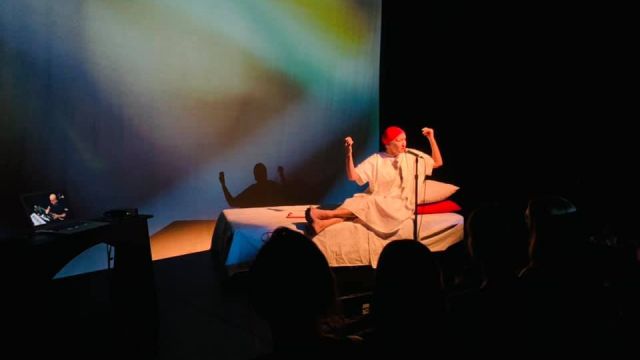Calls to 1194
Occasionally, we have the opportunity to experience theatre that transports us into something like an ethereal flight through time and place. Sandra Thibodeaux’s epic poem is one such masterpiece, performed with a rare and restless authenticity and an equally brittle honesty and self-awareness. We were, from the first words, utterly enthralled and completely on her side in the life and death battle against her failing heart and her equally failing faith in the ‘gowns’ – the doctors and attendant ‘scrubs’ – who might save her life.
In a tour de force performance of her intensely personal contemplation, Thibodeaux delivers a luxurious hour of insight, naivety, fear, anxiety and a stark awareness of self, place, and ever-present rendering of time – or the impending lack of it. Rhythmically and structurally, the work perfectly mirrors her beloved tides – with low tide solicitude rendered with a simple click of her fingers and the calming codas of a call to 1194 to hear ‘the talking clock man’s’ dulcet tones (who I certainly remember from my childhood) – ‘Beep. Beep. Beep. At the third stroke …’.
Thibodeaux has experienced a Takotsubo event, where her heart is not pumping enough oxygenated blood around her body, and she is lying in hospital hooked to drips and machines, preparing to die. But rather than focusing on the strident and strenuous clinical circumstances, she escorts us into another world of memories – a female turtle (a beautifully recurring motif) returning to the ocean having laid her eggs. The sun … the waves … the colours … the light … the beautiful world that she grieves that she will no longer be a part of. Her brain has not the time to compute her impending absence from the ones she loves in the present, until her son arrives to see her and immediately goes outside for a smoke.
With a master poet’s extraordinary breadth of language and imagination, Thibodeaux weaves through an ocean of reminiscence … of wars, memorials, bombings, and an eventful childhood. The work is enhanced by unexpected flourishes of character and circumstance, of ‘Boofy Kev’, her wife-murdering, child-bashing neighbour who ends up in the hospital bed next to hers. Of how her grandmother relied on the talking clock because she was blind, and the talking clock would let her know that ‘at the third stroke, it would be Gin-o’clock, precisely’. Of her son wheeling her in her wheelchair to the hospital’s rooftop carpark so that she could take in the view of her beloved Darwin.
The performance is powered magnificently by a soundscape created by sound designer, composer, and digital artist, Panos Couros. At this performance, Mr Couros is performing live in Sydney where he is in lockdown, and his performance is being Zoomed into the theatre courtesy of a computer screen. His Moog Subharmonicon creates an impossibly ideal accompaniment – growling, groaning, heaving like the waves, with a bassline that rattles your bones and tonal variations that make your skin tingle. The anti-rhythm pulses and brilliant changes in tempi counterpoints the poetry and its purely theatrical flourishes perfectly, and even though Couros might have been expecting to perform in the theatre, there is something almost perfectly surreal about the instrument being absent – much like the heart monitors, drips, and feeds of the hospital environment we share with Ms Thibodeaux.
Naina Sen’s visual imagery, projected onto a cyclorama, are equally artfully considered and abstract. Like the surprisingly abstract and anti-narrative reminiscences that power the writing, the imagery never assumes that we should immediately be able to identify what we are seeing.
As Thibodeaux is remembering what it was like to be preparing to die, the masterstroke is to weave the life-threatening perils of climate change into the expectations we have that our hearts will always go on beating. That the seasons will always change as we remember them from our childhoods. Climate change, like wars, always risks sounding like agitprop in the theatre – where we come to escape our perilous daily fears and anxieties, not to hear them regurgitated into well-intentioned drama. But the authority of the literary and theatrical instinct and muscle is all Thibodeaux’s, and we realise that she has, quite disarmingly, involved us intimately in the very personal, and possibly final, moments of the memory of her life and what her greatest fears are as she prepares to die. It is an extraordinary generous act, and one that I am incredibly grateful to have been able to share witness.
Geoffrey Williams
Pictured: Sandra Thibodeaux and Panos Couros (Zoomed in from Sydney) in Calls to 1194. Photographer: Lynda McCaffery.
Subscribe to our E-Newsletter, buy our latest print edition or find a Performing Arts book at Book Nook.

